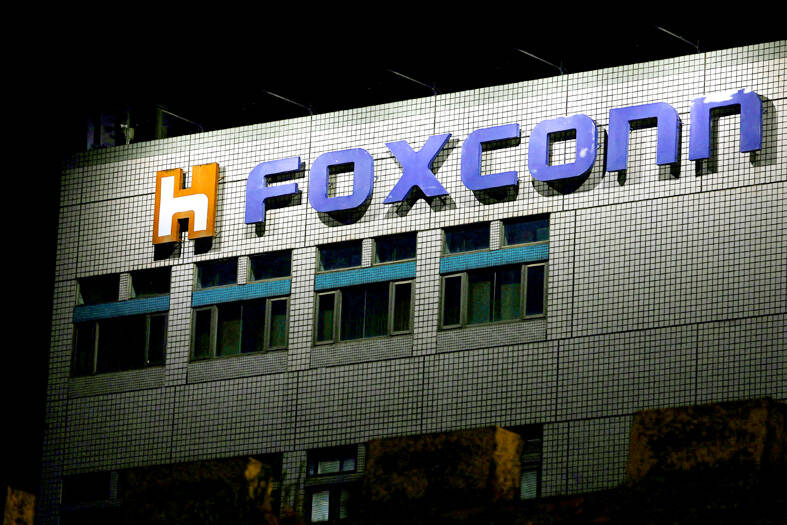Hon Hai Precision Industry Co (鴻海精密) has been fined NT$10 million (US$329,294) by the Ministry of Economic Affairs for not getting regulatory approval for its investment in a Chinese semiconductor company.
Hon Hai’s Shanghai-listed communication network equipment subsidiary Foxconn Industrial Internet Co (FII, 富士康工業互聯網) acquired a stake in Tsinghua Unigroup Co (清華紫光) in July last year without getting the green light from the Investment Commission.
FII disposed of the stake last month, but Hon Hai was still fined by the ministry, the company said in a filing on Thursday with the Taiwan Stock Exchange.

Photo: Reuters/Ann Wang
Hon Hai, known as Foxconn Technology Group (富士康科技集團) internationally, said it did not seek approval from the commission before the investment was made because the deal was completed through a complicated multi-layer structure that made it hard to control how the deal proceeded.
However, the commission said on Thursday that Hon Hai was fined because its indirect acquisition of an 8.23 percent stake in Tsinghua Unigroup without advance approval contravened the Act Governing Relations Between the People of the Taiwan Area and the Mainland Area (台灣地區與大陸地區人民關係條例).
The commission said that because Hon Hai disposed of the Tsinghua Unigroup stake it previously held, there was no concern over a possible technology leak to China that might affect Taiwan’s industrial development.
It also said the fine was reduced to NT$10 million from the up to NT$25 million stipulated by law because Hon Hai has invested about NT$20.4 billion in Taiwan over the past three years and created 7,943 jobs.
Hon Hai disclosed in July that FII’s Xingwei (Guangzhou) Industrial Investment Partnership Ltd (興微廣州產業投資) had bought a stake in Tsinghua Unigroup for 5.38 billion yuan.
Following the deal, Xingwei controlled a 48.91 percent stake in another Chinese company that held a 20 percent stake in Beijing Zhiguangxin Holding Co (北京智廣芯控股), which owned a 100 percent stake in debt-ridden Tsinghua Unigroup after a business restructuring.
Despite its complex structure, the deal raised concerns that it would help strengthen China’s chipmaking capability and compromise Taiwan’s national security, at a time when Taipei was forging closer ties with Washington amid escalating threats from Beijing.
Under pressure, Xingwei, which is 99.99 percent owned by FII, later reached an agreement to dispose of its stake in the company to Yantai Haixiu IC Investment Center (煙臺海秀積體電路產業投資中心) for no less than 5.38 billion yuan (US$793 million), Hon Hai said last month.
In its statement on Thursday, Hon Hai said the NT$10 million fine accounted for only 0.00015 percent of the company’s total sales last year and was unlikely to have any adverse impact on shareholders’ rights and its share price.
According to the commission, Hon Hai has promised to continue to invest in Taiwan over the next couple of years, and it will demand that Hon Hai honor its investment commitment.

Intel Corp chief executive officer Lip-Bu Tan (陳立武) is expected to meet with Taiwanese suppliers next month in conjunction with the opening of the Computex Taipei trade show, supply chain sources said on Monday. The visit, the first for Tan to Taiwan since assuming his new post last month, would be aimed at enhancing Intel’s ties with suppliers in Taiwan as he attempts to help turn around the struggling US chipmaker, the sources said. Tan is to hold a banquet to celebrate Intel’s 40-year presence in Taiwan before Computex opens on May 20 and invite dozens of Taiwanese suppliers to exchange views

Application-specific integrated circuit designer Faraday Technology Corp (智原) yesterday said that although revenue this quarter would decline 30 percent from last quarter, it retained its full-year forecast of revenue growth of 100 percent. The company attributed the quarterly drop to a slowdown in customers’ production of chips using Faraday’s advanced packaging technology. The company is still confident about its revenue growth this year, given its strong “design-win” — or the projects it won to help customers design their chips, Faraday president Steve Wang (王國雍) told an online earnings conference. “The design-win this year is better than we expected. We believe we will win

Chizuko Kimura has become the first female sushi chef in the world to win a Michelin star, fulfilling a promise she made to her dying husband to continue his legacy. The 54-year-old Japanese chef regained the Michelin star her late husband, Shunei Kimura, won three years ago for their Sushi Shunei restaurant in Paris. For Shunei Kimura, the star was a dream come true. However, the joy was short-lived. He died from cancer just three months later in June 2022. He was 65. The following year, the restaurant in the heart of Montmartre lost its star rating. Chizuko Kimura insisted that the new star is still down

While China’s leaders use their economic and political might to fight US President Donald Trump’s trade war “to the end,” its army of social media soldiers are embarking on a more humorous campaign online. Trump’s tariff blitz has seen Washington and Beijing impose eye-watering duties on imports from the other, fanning a standoff between the economic superpowers that has sparked global recession fears and sent markets into a tailspin. Trump says his policy is a response to years of being “ripped off” by other countries and aims to bring manufacturing to the US, forcing companies to employ US workers. However, China’s online warriors